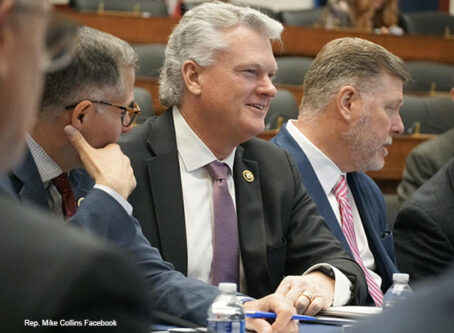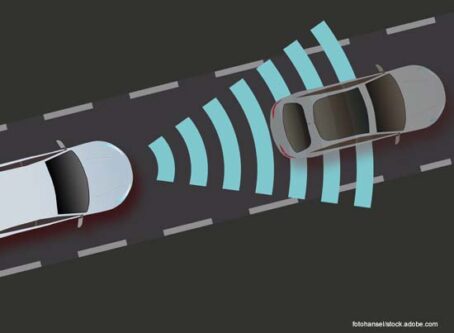Motor carrier to Congress: Invest in infrastructure, truckers
All infrastructure spending isn’t created equal.
That was the owner of a longtime Pennsylvania trucking company’s message to Congress regarding the recently passed infrastructure bill.
On Tuesday, Feb. 15, the House Select Revenue Measures Subcommittee held a hearing titled, “Examining the Economic Impact of Federal Infrastructure Investment.” Mark McClymonds, owner and president of McClymonds Supply and Transit Co. in Portersville, Pa., told members of Congress that the bill failed to meet some of truckers’ essential needs.
“The United States has some critical needs that should be a priority, especially considering our current supply chain challenges,” McClymonds said. “The infrastructure bill last year included some long-overdue investments in our highways and bridges, yet there is a lot more investment needed. It also ignored some key shortfalls, like truck parking. Instead of spending money on special interest ideas, like EV charging stations or unnecessary studies, Congress should put federal dollars into projects that will meet our most pressing needs.”
Despite the infrastructure bill investing about $1.2 trillion overall, the legislation failed to include any money to make sure truck drivers have a safe place to park.
“Truck drivers are an indispensable part of our economy and way of life,” McClymonds said. “The trucking industry moves over 70% of U.S. freight tonnage every year, and many communities rely exclusively on trucks to send and receive products.”
McClymonds said that Congress must do more to invest in core infrastructure and its truck drivers in order to keep the supply chain and America’s economy moving. One way to do that, he said, is to reduce the amount of costly regulations that are passed down to truckers.
“When truckers are forced to spend money to comply with new government regulations or mandates, we must either absorb those costs when the market is tight or pass them along to the customer,” he said.
McClymonds also highlighted truckers’ investment in the Highway Trust Fund and cautioned against such plans as a truck-only vehicle-miles-traveled tax.
“Proposals to impose a truck-only tax on vehicle miles traveled would discriminate against the millions of truckers who deliver essential products to American families,” he said. “While trucks account for only 4% of vehicles on the road and 9% of all vehicle miles traveled nationally, they pay nearly half the tab for the entire Highway Trust Fund. If excise taxes to pay for roads and bridges are increased or amended, it should not be done in a discriminatory way.”
Much of McClymonds’ testimony echoed the stance held by the Owner-Operator Independent Drivers Association, which submitted a letter for the hearing record.
“While the Infrastructure Investment and Jobs Act provides significant funding for our nation’s infrastructure, it fails to deliver on priorities that are most important for truckers,” OOIDA wrote. “Most notably, the law lacks any dedicated funding for expanding truck parking capacity. There is a national shortage of truck parking, which makes it difficult for drivers to find a place to take a break when they need rest or are required to do so by federal law.
OOIDA said the lack of truck parking leads to safety concerns, as well as problems with the supply chain.
“This parking shortage is a national safety crisis, which leads to delays and perpetuates inefficiencies in the supply chain,” The Association wrote. “Truckers will often stop driving early just to take an available parking space, meaning the only thing stopping them from maximizing their productivity is uncertainty about whether they will be able to find parking later on.”
OOIDA lobbied lawmakers throughout the bill process to include an investment in truck parking. The original House bill did include $1 billion for truck parking, but that bill died in the Senate. The bipartisan Senate bill, which ultimately became law, excluded truck parking.
Following that omission, OOIDA sent a letter to Transportation Secretary Pete Buttigieg in November, asking him to use $1 billion in discretionary funding for truck parking.
Like McClymonds, OOIDA also is opposed to funding mechanisms that require a disproportionate amount of taxes from truckers.
“We are steadfastly opposed to funding proposals that would disproportionately burden truckers,” OOIDA wrote. “We are particularly concerned about any proposals that would single out the trucking industry for a truck-only vehicle-miles traveled tax. This would assure that truckers pay a disproportionate cost to prop up the Highway Trust Fund.
“OOIDA also remains opposed to the expansion of tolling. Tolling systems lack the efficiency and effectiveness of current funding mechanisms. Research has shown tolling is an extremely wasteful method of generating revenue compared to fuel taxes, with as much as 30% of funds going to administrative costs rather than the construction and rehabilitation of roads and bridges. Truckers predominantly pay tolls out-of-pocket, as shippers seldom reimburse toll charges under the freight rate system.” LL









